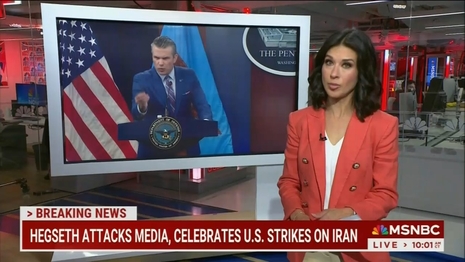On her show Thursday morning, MSNBC’s Ana Cabrera made her opinions obnoxiously clear through her biased leading questions. While holding a group discussion on President Trump’s disagreement with a leaked early intelligence report of the damages to Iran’s Fordow nuclear facility, Cabrera asked her guests about what Trump’s denial of the report meant, never once asking whether the report was accurate or not.
It was already known that this leaked report was nothing more than a preliminary, low-confidence report, but that was not important to Cabrera as she asked one of her guests, New York Times correspondent Peter Baker, “Is this an administration that will accept any intel that suggests otherwise? Can the American people have confidence in the info this White House is sharing?”
Naturally, Baker, along with the rest of the guests in that segment, played into Cabrera’s narrative. Baker made it clear what he thought Trump’s rejection of the report meant:
The signal the president has sent is that he wants the intelligence to fit his preconceived outcomes, what he wants the outcome to be. Now, it may be that he did achieve the outcome that he is describing. We don’t know that, these intelligence reports are preliminary. They are still gathering information. More information will be, you know, assessed by professionals who know what they’re talking about. But no question that the pressure and the signal from the White House is that the intelligence ought to suit what the president wants it to say.
Even while acknowledging the preliminary nature of the reports, Baker still made Trump out as untrustworthy for not taking the report on its face.
It’s a good thing the president didn’t blindly accept the report considering the intel leak left out most of the information, putting aside countless other reports of significant damage to highlight one low-confidence statement.
 Secretary of Defense Pete Hegseth acknowledged the leak’s inaccuracies that morning, but MSNBC, as per usual, ignored his comments, showing only the statements that matched their story.
Secretary of Defense Pete Hegseth acknowledged the leak’s inaccuracies that morning, but MSNBC, as per usual, ignored his comments, showing only the statements that matched their story.
They only quoted Hegseth as denying the information with a 27-second spliced clip from a 42-minute press conference so Cabrera could ask, “How concerning is this – the discussion and the way that the administration currently is framing it?”
Retired Lieutenant General Ben Hodges responded:
The worst thing here is that people are going to lose confidence in our great intelligence professionals because they’ll begin to perceive that the intelligence that does get out, exactly as Peter was describing, is – it’s something that was contorted to meet the narrative needs of the White House, or it was leaked because somebody disagreed with what was out there.
Moving on to the president’s war powers, Cabrera continued to escalate her narrative, going so far as to ask Baker, “Do checks and balances still exist in Washington?” At this point, even Baker wasn’t buying into Cabrera’s story. He instead acknowledged that this was a bipartisan pattern seen across many presidencies, and that Trump’s strikes reflected a shift in politics rather than a shift in power.
Cabrera’s reporting of the leaked Fordow damage assessment demonstrated a clear bias through her lines of questioning. Her focus was clearly not on the truth, as she blatantly misrepresented it to push her own version of the facts, one that painted the White House in a bad light while praising the shoddy, inaccurate leak.
The transcript is below. Click “expand” to read.
MSNBC’s Ana Cabrera Reports
June 26, 2025
11: a.m. EST(…)
ANA CABRERA: Peter, the White House has, from day one, before any intel assessment happened, has been saying that Iran’s nuclear facilities were obliterated. Is this an administration that will accept any intel that suggests otherwise? Can the American people have confidence on the info this White House is sharing?
PETER BAKER: Well, the signal the president has sent is that he wants the intelligence to fit his preconceived outcomes, what he wants the outcome to be. Now, it may be that he did achieve the outcome that he is describing. We don’t know that, these intelligence reports are preliminary. They are still gathering information. More information will be, you know, assessed by professionals who know what they’re talking about. But no question that the pressure and the signal from the White House is that the intelligence ought to suit what the president wants it to say.
That’s not the first time that’s happened in our history, but it’s obviously problematic in a lot of ways. You know what, policymakers need accurate, dispassionate, detached intelligence to make reasoned choices, not intelligence that suits what they already want to believe. Now, you know, instead of, of course, quarreling with the intelligence, in some ways, the president prefers to quarrel with reporters. It’s an easy thing to do. Shoot the messenger has a long-standing tradition in our capital, in a lot of capitals. These reporters, though, who have accurately reported what the Defense Intelligence Agency preliminary intelligence showed. That intelligence may not be complete, that intelligence may be supplanted by other intelligence. But it’s obviously not the reporter’s fault for reporting accurately on what they have learned. That’s now something of great public interest. Now, the president wants this to be true, wants it to be true that these facilities were obliterated because he wants to basically declare an end to the operation, right? If there’s intelligence suggesting that it didn’t quite get everything, then he might come under pressure to have another operation, which I think he doesn’t really want to do.
CABRERA: General, this morning, Defense Secretary Hegseth was asked about Iran’s enriched uranium stockpile. Watch this.
(Cuts to video)
JENNIFER GRIFFIN: Do you have certainty that all the highly enriched uranium was inside the Fordow mountain, or some of it, because there were satellite photos that showed more than a dozen trucks there two days in advance. Are you certain none of that highly enriched uranium was moved?
PETE HEGSETH: Of course, we’re watching every single aspect [Jump Cut] We’re looking at all aspects of intelligence [Jump Cut]. I’m not aware of any intelligence that I’ve reviewed that says things were not where they were supposed to be, moved or otherwise.
(Cuts to live)
CABRERA: Then you have the president asserting on social media that this uranium stockpile wasn’t moved ahead of the strikes and saying that, with some sense of certainty, although, General, we do know that the International Atomic Energy Agency had been notified by Iran as far back as June 13th that they were going to take specific measures to protect those stockpiles and to protect their nuclear capabilities. So how concerning is this – the discussion and the way that the administration currently is framing it?
LIEUTENANT GENERAL BEN HODGES: Well, the worst thing here is that people are going to lose confidence in our great intelligence professionals because they’ll begin to perceive that the intelligence that does get out, exactly as Peter was describing, is – it’s something that was contorted to meet the narrative needs of the White House, or it was leaked because somebody disagreed with what was out there.
And this is not only bad for our decision makers in our leadership, but also our allies. We depend so much on other nations, their intelligence agencies working closely with ours, and this intelligence sharing is a two-way street. And this damages our intelligence capabilities, when people begin to lose confidence in our intelligence process. For me, this is the biggest danger here. I would be stunned if the Iranians had not moved or had not tried to move some of the materials out of there, because there’s been so much talk in the last weeks about a possible strike. And certainly the Israelis had telegraphed this, so, I mean, nobody should be surprised if the Iranians actually were able to move some materials out of there. That’s why the patience, you know, let the processes, and we’ve got the best in the world, let the processes work so that we know.
CABRERA: Yeah, and I also wanted to mention that the International Atomic Energy Agency said just this morning that there are other nuclear facilities in Iran that were not hit. So they would maintain the capabilities that those places as well, you would think.
Peter, I also wanted to ask you about what we’re hearing from Speaker Johnson, who’s arguing that the War Powers Act, which limits presidential power to wage war, is unconstitutional. Those words from the speaker, do checks and balances still exist in Washington?
BAKER: Well, this is a bipartisan issue, actually going back over multiple presidents. Multiple presidents of both parties have basically quarreled with the War Powers Act or failed to abide by it because they said it didn’t apply in this circumstance or that circumstance.
Basically, since the end of World War II, Congress has abrogated its responsibility as the body assigned by the Constitution to declare war, and the executive, in this case, President Trump, but other presidents as well, have taken it upon themselves to say, look, in my job as commander in chief, I have the responsibility and the right under the Constitution, to use military force in limited ways short of a full-on war.
The question is whether this operation would qualify as that. Is this the Iranian nuclear program posing a direct national security threat to the United States? Does this qualify as a war if it’s a one-off military operation that, you know, destroys these facilities, given that there are no ground troops and no continuing operations? These are questions that have been raised on Capitol Hill. They’re being raised by Democrats, but in the past they’ve been raised by Republicans. And I think that, you know, this is a sign of how our war policy, our war power policy, in effect, has evolved over the years, giving great latitude to presidents to use force without Congress participating.
CABRERA: Peter Baker, Monica Alba, Melanie Zanona, and Lieutenant General Hodges, thank you all very much.















